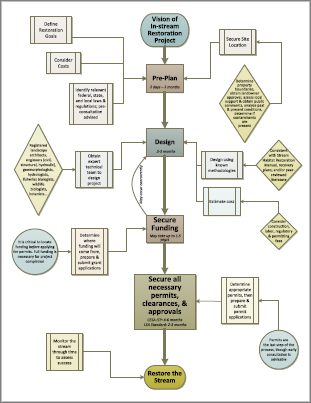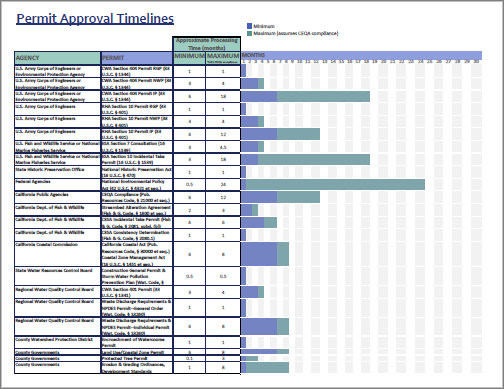HREA can be an excellent tool for restoration project proponents looking for a streamlined permitting process. There are many benefits to pursuing an HREA approval, which include:
- Approved HREA projects do not require additional approvals from CDFW such as a Lake and Streambed Alteration agreement or CESA Incidental Take permit.
- Fees for an HREA approval request are much smaller than fees for a CESA ITP, which are commonly above $30,000.
- Approval timelines are expedited. CDFW is required to provide a determination on HREA approval requests within 30 or 60 days depending on the approval pathway.
- Small habitat restoration projects under 5 acres are categorically exempt from CEQA (Cal. Code Regs., tit. 14, § 15333).
Pre-consultation is opening a dialogue with CDFW early in the planning process, before an approval request is submitted. Pre-consultation can help avoid incomplete requests or delays in the approval process, and can help with the development of appropriate species protection measures. Communicate with the CDFW Region where the project will be completed in order to discuss project details and ensure the project’s eligibility under the HREA.
Prior to acquiring federal, other state or local permits or approvals, there are other components of planning restoration or enhancement projects. For example, a project proponent may need to finalize project plans and designs, produce cost estimates, and secure funding prior to applying for agency permits, clearances, and approvals.

Click Image to Enlarge
A restoration project has the primary purpose of improving fish and wildlife habitat and is considered voluntary if:
- The project is not being done as compensatory mitigation; and
- The project is not part of a regulatory permit for a non-habitat restoration or enhancement construction activity, a regulatory settlement, a regulatory enforcement action, or a court order.
Projects authorized under the Act do not require any other permits, agreements, or approvals from CDFW such as a Lake or Streambed Alteration agreement or California Endangered Species Act permit.
There may be other federal, state, or local agencies that will require permits or approvals for restoration or enhancement projects. These may include City/County/Regional agencies, State Water Resource Control Board, US Fish and Wildlife Service, National Oceanic and Atmospheric Administration/National Marine Fisheries Service, and Army Corps of Engineers

Click Image to Enlarge
You may submit your request digitally online or as a hardcopy by mail. To file online via the EPIMS Document Repository, visit the EPIMS page and follow the provided directions. To file by hardcopy, please mail all appropriate documents to the local CDFW Regional Office.
After submitting your request, along with all applicable fees, CDFW will review it for eligibility, completeness, and consistency with Fish and Game Code. CDFW will make a determination on the request within 60 days for section 1652 approval requests or 30 days for section 1653 approval requests. CDFW may contact you if additional information is required.